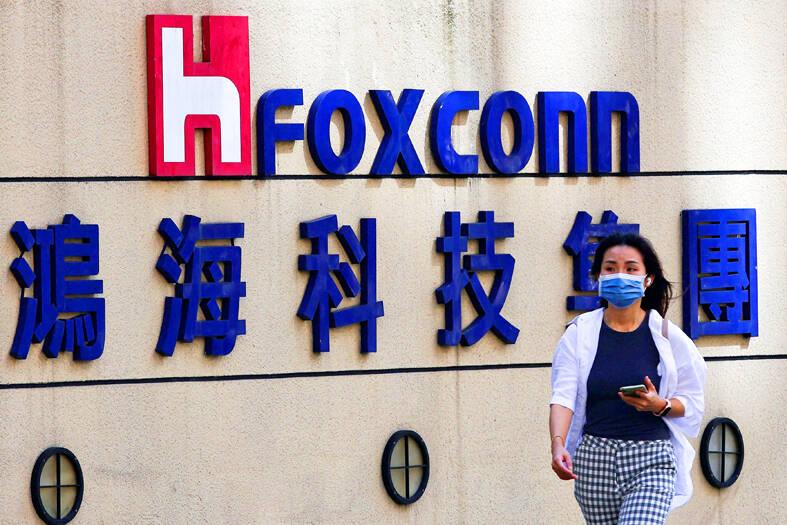Taiwan-based manufacturing giant Hon Hai Precision Industry Co (鴻海精密) has invested US$142 million (NT$4.69 billion) in Texas, which industrial sources close to the deal said was aimed at expanding its artificial intelligence (AI) server capacity.
In a statement filed Monday with the Taiwan Stock Exchange, where Hon Hai shares are traded, the company said it had acquired an 86.34-acre lot in Houston and a 1-million-square-feet building through its cloud solution subsidiary Ingrasys Technology Inc.
While Hon Hai, better known as Foxconn globally, did not specify the purpose of the investment, saying only that it was for operational needs, the sources said it would be used to expand AI server production to initially cater to clients in North America, except Apple Inc.

Photo: Reuters
In late February, Apple announced it would partner with Hon Hai to build an AI server assembly plant in Houston by 2026, with products rolled out by the 250,000-square-feet facility to be used to support Apple's data centers.
Before Monday's announcement, Ingrasys Technology previously acquired a building and piece of land in Sunnyvale, California for US$128 million, with industrial sources saying the investment was also made to boost AI server capacity.
According to Hon Hai, it is currently expanding AI server capacity in several areas, including Taiwan, the US, Mexico and Vietnam, to give the company flexibility in adjusting high-end AI server production based on market conditions.
At an investor conference held on March 14, Hon Hai said it expected AI server sales of more than NT$1 trillion (US$30.30 billion) this year amid the current boom in demand for AI.
Hon Hai, the world's largest contract electronics maker, said the AI servers it assembles are expected to account for 50 percent of its total server revenue and seize a share of over 40 percent of the global AI server market this year.
Last year, Hon Hai posted a new high of NT$6.86 trillion in consolidated sales, up 11 percent from the previous year.
Hon Hai started investing in the US in 1985 before it went to China in 1988.
Hon Hai has since invested in 24 countries around the world and operates 233 facilities.
According to Hon Hai Chairman Young Liu (劉揚偉), the company spent more than NT$340 billion in capital expenditure to expand production worldwide from 2022 to last year and its global expansion is expected to make it resilient amid US tariff threats.

Alain Robert, known as the "French Spider-Man," praised Alex Honnold as exceptionally well-prepared after the US climber completed a free solo ascent of Taipei 101 yesterday. Robert said Honnold's ascent of the 508m-tall skyscraper in just more than one-and-a-half hours without using safety ropes or equipment was a remarkable achievement. "This is my life," he said in an interview conducted in French, adding that he liked the feeling of being "on the edge of danger." The 63-year-old Frenchman climbed Taipei 101 using ropes in December 2004, taking about four hours to reach the top. On a one-to-10 scale of difficulty, Robert said Taipei 101

Nipah virus infection is to be officially listed as a category 5 notifiable infectious disease in Taiwan in March, while clinical treatment guidelines are being formulated, the Centers for Disease Control (CDC) said yesterday. With Nipah infections being reported in other countries and considering its relatively high fatality rate, the centers on Jan. 16 announced that it would be listed as a notifiable infectious disease to bolster the nation’s systematic early warning system and increase public awareness, the CDC said. Bangladesh reported four fatal cases last year in separate districts, with three linked to raw date palm sap consumption, CDC Epidemic Intelligence

US climber Alex Honnold left Taiwan this morning a day after completing a free-solo ascent of Taipei 101, a feat that drew cheers from onlookers and gained widespread international attention. Honnold yesterday scaled the 101-story skyscraper without a rope or safety harness. The climb — the highest urban free-solo ascent ever attempted — took just more than 90 minutes and was streamed live on Netflix. It was covered by major international news outlets including CNN, the New York Times, the Guardian and the Wall Street Journal. As Honnold prepared to leave Taiwan today, he attracted a crowd when he and his wife, Sanni,

Taiwanese and US defense groups are collaborating to introduce deployable, semi-autonomous manufacturing systems for drones and components in a boost to the nation’s supply chain resilience. Taiwan’s G-Tech Optroelectronics Corp subsidiary GTOC and the US’ Aerkomm Inc on Friday announced an agreement with fellow US-based Firestorm Lab to adopt the latter’s xCell, a technology featuring 3D printers fitted in 6.1m container units. The systems enable aerial platforms and parts to be produced in high volumes from dispersed nodes capable of rapid redeployment, to minimize the risk of enemy strikes and to meet field requirements, they said. Firestorm chief technology officer Ian Muceus said